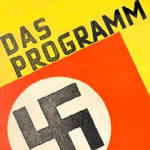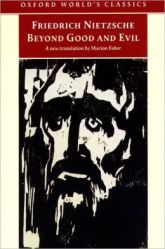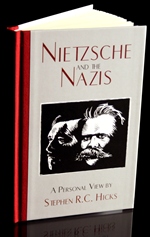Dr. Przemysław Zientkowski’s foreword to the Polish edition of my Nietzsche and the Nazis, translated into English. A PDF version is here, and the HTML version follows.
Foreword to the Polish edition of Stephen Hicks’s Nietzsche and the Nazis
By Przemysław Zientkowski, Ph.D.
 History teaches us that in politics—in order to reinforce the message, achieve the set goals and eventually justify all actions, including bloody terror—stable theoretical foundations are indispensable. People, when individually fed with ideas, will feel inward opposition to practical activities that are incomprehensible to them; put in opposition to the “authorities”, they will change their minds quickly and give in to manipulation. The authorities also often remain unaware of their role of cogs in a great machine of oppression, when, often posthumously, their ideas are interpreted according to a new and different reality and squeezed into stiff and tight frames of political doctrines or systems that are sometimes extremely different from their outlooks.
History teaches us that in politics—in order to reinforce the message, achieve the set goals and eventually justify all actions, including bloody terror—stable theoretical foundations are indispensable. People, when individually fed with ideas, will feel inward opposition to practical activities that are incomprehensible to them; put in opposition to the “authorities”, they will change their minds quickly and give in to manipulation. The authorities also often remain unaware of their role of cogs in a great machine of oppression, when, often posthumously, their ideas are interpreted according to a new and different reality and squeezed into stiff and tight frames of political doctrines or systems that are sometimes extremely different from their outlooks.
One of the more vivid examples is that of Jean-Jacques Rousseau, who bears the stigma of being the French Revolution’s initiator and, at the same time, its opponent. As Louis Philip points out in his diaries, the most zealous opponents of the great revolution in France and its advocates both admit unanimously that it was prepared for and led to by the works of Raynal, de Mably, Voltaire, and especially Rousseau[1]. The person of Rousseau is of particular importance since it allows us to point out certain light-heartedness in the author of The Joyful Wisdom. More than once did Nietzsche accuse Rousseau of preparing the revolutionary ideology, branding him severely as an impeller of the bloodiest farce that ever touched humankind. It is ironic, though, that not even half a century later Nietzsche himself became a victim of a perversity of history and was called an impeller of much bloodier, much more powerful “farce” that broke out 150 years after French Revolution.
The person of Rousseau is of particular importance since it allows us to point out certain light-heartedness in the author of The Joyful Wisdom. More than once did Nietzsche accuse Rousseau of preparing the revolutionary ideology, branding him severely as an impeller of the bloodiest farce that ever touched humankind. It is ironic, though, that not even half a century later Nietzsche himself became a victim of a perversity of history and was called an impeller of much bloodier, much more powerful “farce” that broke out 150 years after French Revolution.
The question of the role of Friedrich Nietzsche philosophy in the rise of Nazism has been asked many a time. It is undoubtedly the aftermath of propaganda activities that used the philosopher’s authority to support the origins and the functioning of the Third Reich[2]. While among the enthusiasts of National Socialism and Adolph Hitler himself there were only few philosophers, it is assumed that they justified the very fact of the existence of some theoretical, more specifically philosophical, foundations of the sinister ideology—the doctrine that could be inscribed into the strategy of creating the cult of German spirit and race. Martin Heidegger’s suggestive interpretation of Nietzsche works contributed much to its development, which not once led to mistaken identification of philosophy of the author of Beyond Good and Evil with Heidegger’s Nazi opinions, along with the manipulation of some facts from philosopher’s life.
Martin Heidegger’s suggestive interpretation of Nietzsche works contributed much to its development, which not once led to mistaken identification of philosophy of the author of Beyond Good and Evil with Heidegger’s Nazi opinions, along with the manipulation of some facts from philosopher’s life.
It seems that appropriating of philosopher’s was provoked by his sister Elisabeth Förster-Nietzsche. Undoubtedly, she was motivated to use her brother’s philosophy because of her own unfulfilled ambitions.[3]
Nazi propaganda needed national heroes—geniuses like Friedrich Nietzsche. As a result, even though Hitler was not a special admirer of the author of Ecce Homo, he decided to recognize him as a symbol, one that might arise and reinforce religious feelings in people.[4] Symbolically “incorporating” posthumously the philosopher into the ranks of the  , in 1934 Adolph Hitler presided over the Weimar celebration of the 90th anniversary of philosopher’s birthday. After this celebration, one could find in all SS barracks a poster with a famous slogan from Nietzsche: “Praised be the one who makes us tough”. Another symbolic episode was lodging a copy of Thus Spoke Zarathustra in the crypt under the monument in Tannenberg, along with copies of The Myth of the Twentieth Century by Alfred Rosenberg and Mein Kampf by Adolph Hitler.[5] A year later the Führer, as a guest of honor, was present at the funeral of the thinker’s sister. Consequently, in the after-war period, in legal and scientific circles—but mostly among philosophers—it was claimed that the aim of Nietzschean philosophy was to strengthen Nazi theory.[6]
, in 1934 Adolph Hitler presided over the Weimar celebration of the 90th anniversary of philosopher’s birthday. After this celebration, one could find in all SS barracks a poster with a famous slogan from Nietzsche: “Praised be the one who makes us tough”. Another symbolic episode was lodging a copy of Thus Spoke Zarathustra in the crypt under the monument in Tannenberg, along with copies of The Myth of the Twentieth Century by Alfred Rosenberg and Mein Kampf by Adolph Hitler.[5] A year later the Führer, as a guest of honor, was present at the funeral of the thinker’s sister. Consequently, in the after-war period, in legal and scientific circles—but mostly among philosophers—it was claimed that the aim of Nietzschean philosophy was to strengthen Nazi theory.[6]
However, there then appeared the first differences when interpreting the philosopher’s attitude, which later triggered a number of conflicts. There are the famous opinions of the main Nazi theoretician who said straightforwardly that “Nietzsche was an enemy of socialism, enemy of nationalism and an enemy of the race concept”; and an appalled professor Arthur Drews, in his article “Nietzsche als Philosoph des Nationalsozialismus?”, called the author of Beyond Good and Evil “an enemy of Germany and anything that is German”, “an individualist whose thought was contradictory to socialism”, and “an author who gave the Jews a visible place in his philosophy of politics”[7]. A number of works directly charge the philosopher with responsibility. One can mention E. Barker’s Nietzsche and Trietschke: The Worship of Power in Modern Germany or Polish manuscripts by S. Rozmaryn, U źródeł faszyzmu. Fryderyk Nietzsche.
A number of works directly charge the philosopher with responsibility. One can mention E. Barker’s Nietzsche and Trietschke: The Worship of Power in Modern Germany or Polish manuscripts by S. Rozmaryn, U źródeł faszyzmu. Fryderyk Nietzsche.
It is just the 75th anniversary of the outbreak of the most tragic event—the war started by the Nazis—and there are still arguments over the treatment of the reputation of the author of Thus Spoke Zarathustra. On the one side are those accusing him of initiating Nazis ideas, and on the other side are those recognizing in him the one who, observing the convulsions of the falling German nation, diagnosed accurately what it would lead to.
There are no doubts that the book by Professor Stephen R.C. Hicks, whose Polish edition has just been published by Fuhrmann Foundation Publishing House, is a perfect part of the discourse. The author proves that the apotheosis of war in Friedrich Nietzsche’s philosophy is not in the least his admiration of pure militarism. There is no shadow of doubt that Nietzsche described his own “war philosophy”. Exaggeratedly, in a very bold statement, we can call in this way the part of his literary output which refers to military conflicts. Making an attempt to relate Nietzsche’s philosophy to one of the versions of fascism, which undoubtedly was a formal ideology of the NSDAP (National Socialist German Workers’ Party), Hicks characterizes Nazism in such a way that it is at least partially congruent with the output of the author of The Dawn. There is no question that “something” of Nietzsche’s opinions can be consistent with Nazis theory. However, this “something”—more than misinterpreted “willpower”—will not in the least be the incitement to vile actions, for which Germany became infamous during World War II.
Making an attempt to relate Nietzsche’s philosophy to one of the versions of fascism, which undoubtedly was a formal ideology of the NSDAP (National Socialist German Workers’ Party), Hicks characterizes Nazism in such a way that it is at least partially congruent with the output of the author of The Dawn. There is no question that “something” of Nietzsche’s opinions can be consistent with Nazis theory. However, this “something”—more than misinterpreted “willpower”—will not in the least be the incitement to vile actions, for which Germany became infamous during World War II.
The author justly emphasizes that National Socialism, as described in detail by Adolph Hitler in Mein Kampf, was not a philosophical doctrine in the strict sense. It was not an ideological system but a collage of various outlooks that together made up a goal, which was to take revenge for the lost war and a Treaty of Versailles that was unfair to Germany. The concept was a conglomeration of views dating back to Old Germanic times—just like the leadership idea[8], the nineteenth-century theories of reborn neo-paganism, to irrationalism, collectivism, autocratic, and anti-liberal ideologies. In addition, the omnipresent spirit of Romanticism was forcing the primacy of feelings over reason, community over individuality, and nature over civilization. It was connected with pursuing freedom of national character, omnipresent myths about blood and race, along with admitting that the status of individuality is contractual, which resulted in rejecting the right to exist of “lower units”. Attempts to replace former names of national elements (population, area) with newspeak such as “living space” or “national collectivity”, the cult of Aryan race—and eventually social Darwinism, mass anti-Semitism, and bloody extermination policy. All those features cumulated in an immoral, sinister ideology of National Socialism, which resulted in its final product—war to an extent not known before, fought with an incredible momentum—both towards enemy soldiers as well as their women, children, and the elderly. A war, the assumed goals of which—“high and lofty”—even back then must have seemed unattainable.
The concept was a conglomeration of views dating back to Old Germanic times—just like the leadership idea[8], the nineteenth-century theories of reborn neo-paganism, to irrationalism, collectivism, autocratic, and anti-liberal ideologies. In addition, the omnipresent spirit of Romanticism was forcing the primacy of feelings over reason, community over individuality, and nature over civilization. It was connected with pursuing freedom of national character, omnipresent myths about blood and race, along with admitting that the status of individuality is contractual, which resulted in rejecting the right to exist of “lower units”. Attempts to replace former names of national elements (population, area) with newspeak such as “living space” or “national collectivity”, the cult of Aryan race—and eventually social Darwinism, mass anti-Semitism, and bloody extermination policy. All those features cumulated in an immoral, sinister ideology of National Socialism, which resulted in its final product—war to an extent not known before, fought with an incredible momentum—both towards enemy soldiers as well as their women, children, and the elderly. A war, the assumed goals of which—“high and lofty”—even back then must have seemed unattainable. 
How was this machine of terror triggered? How was philosophy involved? How much fault belongs to Nietzsche? That is what this book is about.
Przemysław Zientkowski, Ph.D.
Chojnice, Poland
Notes
[1] Compare Ludwik Filip, Pamiętniki z czasów Wielkiej Rewolucji, translated by W. Dłuski, Warszawa 1988, p. 221.
[2] The most important are mentioned by Mirosław Żelazny. Those were Alfred Baeumler—author of such papers as: Nietzsche der Philosoph und Politiker (1937), Nietzsche als politischer Erzieher (1935), Nietzsche und der National Sozialismus (1939), Heinrich Härtle—author of a well-known dissertation Nietzsche und der Nationalsozialismus (1937), and Alfred Rosenberg—author of Der Mythus des 20. Jahrhunderts (1930). A meaningful interpretation of Nietzsche’s works by Martin Heidegger causes the thoughts of the two thinkers often to be identified. More about that in M. Żelazny, Nietzsche. Ten wielki wzgardziciel, Torun 2007, pp. 206-220.
[3] In spite of her brother’s strong disagreement, she married Bernhard Förster, who already in the Wilhelmine era became famous as a zealous advocate of anti-Semitism. As a result of his racist activities, he was forced to leave Germany. Together with his wife he went to Paraguay to settle there a neo-German racist colony. The undertaking proved to be unsuccessful and ended with Bernhard’s suicide in 1889. Desperate and full of hatred towards those people because of whom her husband killed himself, Elisabeth returned to Germany and took care of her seriously ill brother. Soaked with the ideas her had husband defended until the end of his life, she never stopped implementing them in life.
[4] Thomas Mittmann claims that it was then that Hitler suggested erecting the philosopher’s monument in Weimar, on which he spent 50 thousand marks. It signifies the great respect the Führer had for the philosopher. Compare T. Mittmann, Vom ‘Günstling’ zum ‘Urfeind’ der Juden. Die antisemitische Nietzsche – Rezeption in Deutschland bis zum Ende des Nationalsozialismus, Würzburg 2006, p. 103.
[5] B. Taureck, Nietzsche und der Faschismus. Eine Studie über Nietzsches politische Philosophie und ihre Folgen, Hamburg 1989, p. 80.
[6] Although there is no doubt that the Nazis’ appropriating Nietzsche was based on selective reading, often manipulated and out of context, one cannot deny that some elements assimilated by Nazis were actually present in Nietzsche philosophy. At least, this is what the Nuremberg Tribunal admitted when symbolically accusing Fichte, Hegel, as well as Nietzsche. According to Rosa Sala Rose, in the prosecution’s opening speech, the French prosecutor Francis de Menton, emphasizing that it was not his intention to connect Nietzsche philosophy with brutal primitivism of Nazism, still claimed that “Nietzsche is among those ancestors to whom Nazism justly refers to as it was him who first compactly criticized values of humanism, and besides his vision of dominance of people gifted with unlimited power over masses announced Nazi regime. (…) Morality of immorality, the consequence of the purest Nietzsche’s doctrines admits destruction of each and every conventional morality as human’s most important duty”. Compare. R.S. Rose, Krytyczny słownik mitów i symboli nazizmu, transl. Z. Jakubowska, A Rurarz, Warsaw 2006, p. 166.
[7] A. Drews, Nietzsche als Philosoph des Nationalsozialismus?, “Nordische Stimmen“, 1934, pp. 172-179. Cited after R. Safranski, Martin Heidegger: Between Good and Evil, Cambridge 1999, p. 300.
[8] It has its legal and political justification: “Nazism in the nation theory meant breaking up with a concept of legal positivism, in which the standard of conduct is law. Carl Schmidt claimed that sovereignty of authorities’ decision is above law. Since the political act is more important than legal standards, the leader is not any more restricted in his actions. In a Nazi country the leader’s will is a law”. J.Derek, Nazizm [in:] M. Siwiec (ed.) Słownik myśli społeczno-politycznej, Bielsko-Biała 2004, p. 450.
[More information here about the editions and translations of Nietzsche and the Nazis.]
This is marvelous.